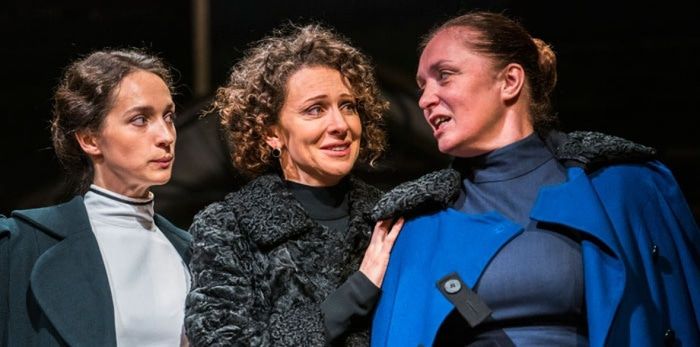Theatre Review | Maly Theatre Three Sisters: Waiting for Moscow
By Ruby Fischer
The Vaudeville Theatre
Dreamers: Ekaterina Tarasova, Ksenia Rappoport and Irina Tychinina in Three Sisters Photo: Tristram Kenton
“In two or three hundred years, life will be unimaginably beautiful.”
It’s hard not to feel that Igor Chernevich’s bearded Vershinin has hit a nerve that sends a ripple of laughter through the seats at the Vaudeville. Far be it from us to disabuse him of his imagined utopia, a future bright with hot air balloons, superhuman senses and beautifully tailored coats. Humanity, he tells us, is destined for something astonishing. We just have to wait, and work. As for those of us alive today? “They’ll forget us. That is our fate.”
The allure of possibility haunts this finespun production by director Lev Dodin of the Maly Theatre, St Petersburg, which tells the story of the three Prosorov sisters, care-worn Olga (a brilliant Irina Tychinina); her tempestuous sister Masha (Elizaveta Boyarskaya); and the blossoming Irina (Ekaterina Tarasova). Marooned in a sea of ignorance fifteen miles from the nearest train station, the Prosorovs dream of Moscow, that distant Shangri-La which draws their eyes to some imagined horizon throughout the evening. Soldiers and suitors come and go, bringing with them a vague scent of life outside the sisters’ parochial existence. It is a multiplicity of lives crouched beneath heavy coats, every character outward-facing, always on the brink of leaving forever.
Dodin’s masterful direction speaks to the decade of work that supports this production. Subtle naturalism punctured by occasional bursts of lyrical expressionism reveals a generous and compassionate reading of a text that all too often falls victim to easy cynicism. In Dodin’s hands, schoolteacher Olga and her loquacious brother-in-law Kuligin (a delightful Sergey Vlasov) are allowed a fleeting moment of fulfillment as they fall into a fierce embrace which doesn’t appear in Chekhov’s original text. We also see a different side of the usually fractious and calculating Natasha. Actress Ekaterina Kleopina brings a doe-eyed sensitivity to the young chatelaine, and despite her selfishness we’re never allowed to dismiss her entirely.
Ultimately, however, the victories are few, the darkness inescapable, and the characters seem to teeter on the edge of delusion and self-realisation, dwarfed by Alexander Borovsky’s set - the gaping facade of the Prosorov’s rural home which slowly consumes the stage, forcing them into huddled tableaus even as their isolation from one another becomes increasingly apparent.
This deeply human production is rich, complex and full of heart. The seamless cohesion of the Maly ensemble makes it difficult to highlight individual performances, though Natalia Sokolova lends a vibrant comic charm to the aging servant Anfisa, whose delirious elation upon finding herself comfortably situated in her very own room at the end of the play leaves us with the sense that she alone is satisfied with her lot.
